On & Off the Hill
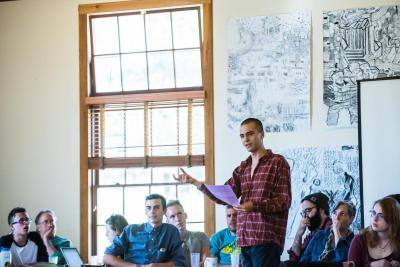
Still Worldly After All These Years, Dana Howell Retires
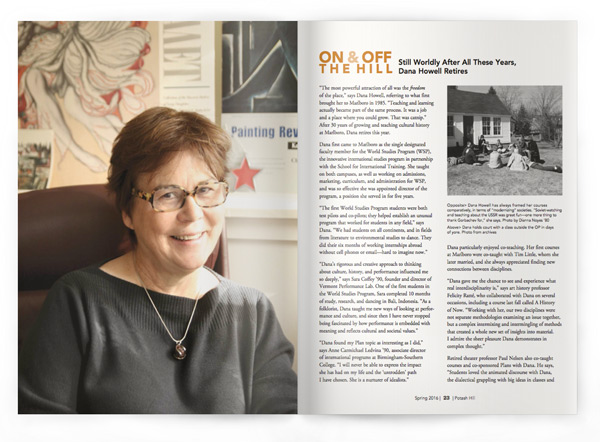
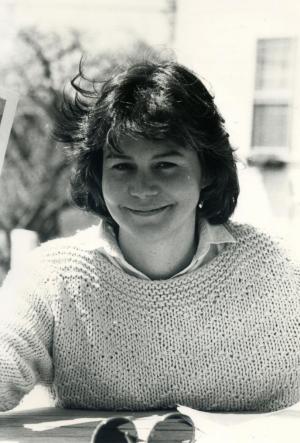 “The most powerful attraction of all was the freedom of the place,” says Dana Howell, referring to what first brought her to Marlboro in 1985. “Teaching and learning actually became part of the same process. It was a job and a place where you could grow. That was catnip.” After 30 years of growing and teaching cultural history at Marlboro, Dana retires this year.
“The most powerful attraction of all was the freedom of the place,” says Dana Howell, referring to what first brought her to Marlboro in 1985. “Teaching and learning actually became part of the same process. It was a job and a place where you could grow. That was catnip.” After 30 years of growing and teaching cultural history at Marlboro, Dana retires this year.
Dana first came to Marlboro as the single designated faculty member for the World Studies Program (WSP), the innovative international studies program in partnership with the School for International Training. She taught on both campuses, as well as working on admissions, marketing, curriculum, and administration for WSP, and was so effective she was appointed director of the program, a position she served in for five years.
“The first World Studies Program students were both test pilots and co-pilots; they helped establish an unusual program that worked for students in any field,” says Dana. “We had students on all continents, and in fields from literature to environmental studies to dance. They did their six months of working internships abroad without cell phones or email—hard to imagine now.”
“Dana’s rigorous and creative approach to thinking about culture, history, and performance influenced me so deeply,” says Sara Coffey ’90, founder and director of Vermont Performance Lab. One of the first students in the World Studies Program, Sara completed 10 months of study, research, and dancing in Bali, Indonesia. “As a folklorist, Dana taught me new ways of looking at performance and culture, and since then I have never stopped being fascinated by how performance is embedded with meaning and reflects cultural and societal values.”
“Dana found my Plan topic as interesting as I did,” says Anne Carmichael Ledvina ’90, associate director of international programs at Birmingham-Southern College. “I will never be able to express the impact she has had on my life and the ‘untrodden’ path I have chosen. She is a nurturer of idealists.” Dana particularly enjoyed co-teaching. Her first courses at Marlboro were co-taught with Tim Little, whom she later married, and she always appreciated finding new connections between disciplines.
“Dana gave me the chance to see and experience what real interdisciplinarity is,” says art history professor Felicity Ratt., who collaborated with Dana on several occasions, including a course last fall called A History of Now. “Working with her, our two disciplines were not separate methodologies examining an issue together, but a complex intermixing and intermingling of methods that created a whole new set of insights into material. I admire the sheer pleasure Dana demonstrates in complex thought.”
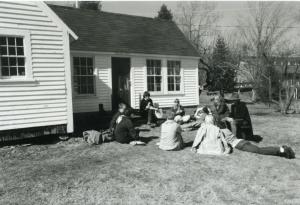 Retired theater professor Paul Nelsen also co-taught courses and co-sponsored Plans with Dana. He says, “Students loved the animated discourse with Dana, the dialectical grappling with big ideas in classes and tutorials. She deeply attached herself to the core idealism of Marlboro and was an inspirational force behind outstanding work of many students.”
Retired theater professor Paul Nelsen also co-taught courses and co-sponsored Plans with Dana. He says, “Students loved the animated discourse with Dana, the dialectical grappling with big ideas in classes and tutorials. She deeply attached herself to the core idealism of Marlboro and was an inspirational force behind outstanding work of many students.”
Literature professor Geraldine Pittman de Battle says, “Sharing Plans with Dana has meant that I have learned, and been excited by, her knowledge and her imagination. Marlboro is a hard place to get to know, but she knew immediately what a wonderful place it was and spent her entire career here keeping the ideals of Marlboro in countless ways.”
“Working with Dana was a privilege and a pivotal part of my undergraduate education,” says Colby Silver ’12, now in graduate school for international affairs at The New School. “The extent of her knowledge in a wide breadth of topics was always inspiring, and reinforced the value of a self-directed liberal arts education.”
“The thing that drew me to Dana, and the thing I admired most about her, was her way of interacting with her students,” says Amy Frazier ’06, now the film and media librarian at Middlebury College. “She’s plainspoken; you always knew that she’d tell you what she really thought. I know I presented her with some teaching challenges back in my day, but I wouldn’t be the person I am without her influence.”
“I’m always surprised by the creativity of students here, and the diversity in this small community,” says Dana, whose international perspective and wide-ranging interests allowed her to work with Plan students on a broad range of topics, from seafaring in Newfoundland to Japanese fashion. “I never know what to expect—they always think of something I haven’t. I have valued the intelligence, independent-mindedness, and irreverent humor of students at Marlboro. I will miss that.”
“Both in class, as well as in the roles of Plan sponsor and friend, Dana has displayed an innovative and inquisitive rigor that I find exhilarating and instrumental,” says one former student, now a graduate student in humanities at University of Chicago. “I continue to reap the benefits of having explored difficult lines of inquiry with her. I very much admire her ability to bring to light increasingly complex networks of cultural connections in contemporary events and thought.”
“I have always been in awe of Dana’s ability to bring together widely disparate ideas in a coherent and meaningful way,” says Kimberly Mills ’89, who went on to get her doctorate and teach anthropology for 10 years. “Dana gave me permission to be myself in the academic world. Her willingness to accept my ideas as both valid and valuable built my confidence as a scholar, and as a person, in ways that no one else has ever matched.”
Starting in 2000, Dana worked with the Open Society Institute (OSI), the international grant-making network now called Open Society Foundations. She led an evaluation team to the first liberal arts college in Russia, then served as chair of an international academic advisory committee. In that capacity she selected and supported projects for democratizing undergraduate teaching in the post-Soviet region, traveling each summer to projects from Kyrgyzstan to Croatia.
“Dana’s passion for teaching captured me, and remains something, I am convinced, that few can do so well,” says Rhett Bowlin ’93, who directed OSI’s International Higher Education Support program for nine years and recruited Dana to work with him. “With Dana I realized that I was empowered to make all kinds of consequentially positive choices in my life, for the rest of my life, including my choice to ask her to work with me.”
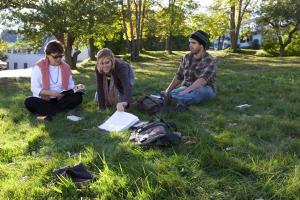 Will Jenkins ’10, who’s working on a doctoral dissertation in history at UC Berkeley, says, “Dana makes education an extended conversation. I genuinely think of my Plan as a product of our conversations over the course of two years, and even casual conversations we had in tutorials have been foundational to my academic trajectory since then. I’ve never met anyone since who treats both her subject and her students with such respect.”
Will Jenkins ’10, who’s working on a doctoral dissertation in history at UC Berkeley, says, “Dana makes education an extended conversation. I genuinely think of my Plan as a product of our conversations over the course of two years, and even casual conversations we had in tutorials have been foundational to my academic trajectory since then. I’ve never met anyone since who treats both her subject and her students with such respect.”
Dana’s plans for retirement are open. Her book The Development of Soviet Folkloristics was reissued last year by Routledge, and she plans to do some more writing. She has the usual list of “finally time for” things, like traveling to Patagonia, learning ancient Greek, and reading War and Peace in Russian.
“For several years, I’ve been focused on the normalization of war, the various presences of war in society, and the extension of war to civilians. So I am most absorbed by that at present. I don’t know how ambitious I’ll be, but I know I won’t be bored.”
Marlboro Marks ADA Anniversary
 Marlboro College celebrated the 25th anniversary of the Americans with Disabilities Act with a series of events during the first week of November. These included film screenings, talks, and discussions, as well as a campus-wide action on November 5 where community members spent a full day using walkers, wheelchairs, and other assistive devices.
Marlboro College celebrated the 25th anniversary of the Americans with Disabilities Act with a series of events during the first week of November. These included film screenings, talks, and discussions, as well as a campus-wide action on November 5 where community members spent a full day using walkers, wheelchairs, and other assistive devices.
“As a faculty member with a disability who is also a professional actress and writer, I embrace the anniversary of the ADA as a timely reminder of the need to create more opportunities for people with disabilities,” says Brenda Foley, Marlboro theater and gender studies professor. “A committee composed of staff, students, and faculty, including those with multiple and varied disabilities, organized the celebration as a way to encourage awareness of—and support for—the diverse range of disabilities in our community.”
“Our goal was to heighten awareness and educate our community about the ADA legislation, and to inspire us to continue the struggles,” says Catherine O’Callahan, assistant dean of academic advising and support, who convened the committee.
The week of events was initiated by disability rights advocate Sarah Launderville (Vermont Council on Independent Living), who led a community-wide “dedicated hour” discussion addressing the complexity of the concept of “limitation.” Later in the week, Deborah Lisi-Baker (Center on Disability and Community Inclusion, University of Vermont) articulated the need for an expansive pedagogy at the college to address all disabilities, from learning to mobility.
There were screenings of Lives Worth Living, a PBS documentary on the disability rights movement, and Disability Liberated, a work by the performance artist group Sins Invalid on disability and prisons. But perhaps the most visible component was the assistive device activity, which occurred in the broader context of the week’s discussions of awareness, assumptions, and advocacy. “
As someone who uses multiple assistive devices every day on our rural campus terrain, I was gratified by the thoughtful consideration and participation of so many of our community members,” says Brenda. “All who participated submitted responses addressing their experience, and we held a roundtable discussion to further frame their participation in the larger context of inclusion and discrimination.”
“I understood that being in the wheelchair all day would be a physical challenge,” says senior Rainbow Stakiwicz, one of 40 participants on campus and at the graduate center who adopted an assistive device for the day. “What I wasn’t expecting was how emotional it would be. I felt detached, tired, strange, and far away from everything. But while I think I learned a lot, and gained a new perspective and way of seeing, I would never presume to know what life is like for a disabled person.”
“Who knew that such a little two-inch square of black patch could undermine my whole sense of self?” says politics professor Lynette Rummel, who chose visual impairment for her disability. Others approximated hearing impairment with earplugs. “The lessons learned will remain with me for a lifetime, of that I am sure.”
Additionally, senior staff, members of the Standing Building Committee, and the event committee held a lunch discussion on curricular initiatives on campus that cross disciplines, as well as on crafting a plan for ADA compliance and accessibility. An ad hoc committee has been designated to complete an accessibility audit of the campus this year, and has been hard at work.
“We have been using an ADA checklist to guide us as we methodically assess each building: clipboards, tape measures, carpenter’s level, door pressure gauge, and cameras in hand,” says Catherine. “By the end of the spring term we will have a report to the community— then the hard work of prioritizing needs will begin.”
“The expansive and collaborative nature of this event, and the thoughtful responses from community members, is indicative of our shared commitment to disability advocacy and activism in the Marlboro community,” says Brenda.
Roberto Lugo Builds Community with Clay
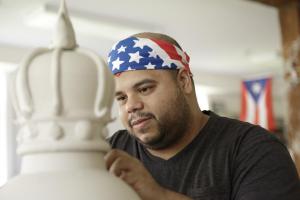 “The sort of questions that Marlboro students ask are aligned with the questions that I ask,” says Roberto Lugo, who joined Marlboro as the ceramics professor last fall. “People here just have a tendency to question everything, which is really refreshing. I would get bored just teaching people how to be technically virtuous potters. I’m more interested in how pottery relates to biology, how pottery relates to anthropology, and all these other ways that people here really question.”
“The sort of questions that Marlboro students ask are aligned with the questions that I ask,” says Roberto Lugo, who joined Marlboro as the ceramics professor last fall. “People here just have a tendency to question everything, which is really refreshing. I would get bored just teaching people how to be technically virtuous potters. I’m more interested in how pottery relates to biology, how pottery relates to anthropology, and all these other ways that people here really question.”
Rob didn’t always know he would be a ceramic artist. Growing up in West Philadelphia, he had a flair for painting graffiti art on abandoned buildings, but he recognized that the only way to be economically successful in that environment was selling drugs. When he realized that too many among his family and friends had suffered from violence or imprisonment due to their involvement in the drug trade, he left the city to live with a cousin in Florida. He started ceramics at a community college there, at the age of 25, and has never looked back. He received his bachelor’s in ceramics from Kansas City Art Institute and an MFA from Pennsylvania State University.
Marlboro is very different from the academic environments Rob had experienced in the past, not to mention the most rural environment in which he has found himself (he relished eating his first apple straight from a tree this fall, for example). What drew him to the college, as is the case for many faculty, was the close-knit community and students’ sense of engagement in their own self-designed course of study.
“I liked that Marlboro has a curriculum that sort of creates itself based on the interests of the students,” says Rob. “I knew if I wanted to walk on new terrain, and think about ways that clay hasn’t been used before, I would really have to be grounded by people who are doing similar things with their own interests. Since I got here I feel like I’m discovering something new every day.”
Rob sees ceramics classes as a unique environment for bringing people together as a community. His introductory class last fall included everyone from freshmen to local community members, including retired economics professor Jim Tober, and he liked creating an environment in which they could learn from each other. He’s found Marlboro to be unique, in his experience, in the level of openness and encouragement that students share with each other.
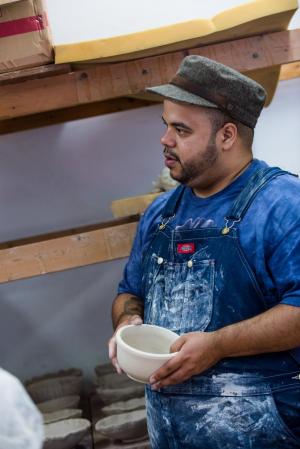 “With artwork, the conversation will be around communicating your idea rather than whether your idea is valid or not,” he says. “That’s what I like about it, because a person is welcome to express themself in whatever way they wish, and our jobs, as we critique the work, is to let that person know whether they are doing it effectively.”
“With artwork, the conversation will be around communicating your idea rather than whether your idea is valid or not,” he says. “That’s what I like about it, because a person is welcome to express themself in whatever way they wish, and our jobs, as we critique the work, is to let that person know whether they are doing it effectively.”
Rob’s own work juxtaposes images from popular culture, European decorative patterning, and rich symbolism drawn from his Puerto Rican heritage, creating a hybrid of visual arts traditions that stimulates new conversations surrounding cultural tolerance. His designs have ranged from combining graffiti and fine china to putting Nobel Prize laureate and Pakistani activist Malala Yousafzai and cartoon character Fat Albert on the same pot.
“It kind of gets people questioning what they hold dear about design,” says Rob. “Are you attached to the aristocratic component of it? Or are you willing to see where both of our needs, and both of our ideas, intersect? I like challenging people in that way.”
Rob believes that his physical work gains strength from his other work as an activist, doing public speaking and making videos that address poverty, prejudice, and injustice. In one video, he returned to Philadelphia, to a block of burned-out houses with “stairways going to nowhere,” where he assembled a pottery wheel out of discarded objects and threw a pot from clay reclaimed on site. His impassioned speech at the 2015 NCECA (National Council on Education for the Ceramic Arts) conference, where he was presented with an emerging artist award, has gained him national recognition.
“I think that sort of multimodal practice really lends itself to the Marlboro community,” Rob says. He is collaborating with economics professor John Rush on a project in Puerto Rico, where faculty and students will help introduce a sustainable pottery workshop to bring revenue to a disadvantaged community. He looks forward to collaborating with other professors as well, in areas of study from anthropology to performance art. One thing that remains to be seen is how Rob’s art will change from his experiences at Marlboro.
“My work has a close relationship with my experience as a human, and has always included a discussion of what it means to be a person of color from a really poor neighborhood,” says Rob. “Now I’m a professor, and I’m in Vermont, so what does that mean for my work? Am I going to draw a moose on my pots? Because I think that would actually look really cool.”
Nelli Sargsyan Pursues Empathy through Anthropology
Anthropology professor Nelli Sargsyan, who also joined the faculty in the fall, was drawn to Marlboro because of its close-knit and egalitarian community, in which she appreciates “the horizontality of structure.” She was impressed that there were engaged students on the search committee that interviewed her, and that people really know each other and make decisions together. Coming from a larger school, she also likes that Marlboro is still focusing on the liberal arts, not on vocational training.
“Marlboro allows space for exploring and thinking, which I really appreciate,” Nelli says. “The classes are small enough that you can engage in meaningful discussions with the students, and they have the freedom to go in directions that interest them.” She feels very aligned with the way writing and critical thinking are so crucial to Marlboro’s academic approach, and with the multidisciplinary nature of the learning environment.
“Here I am limited only by my imagination, in terms of the classes that I could teach, which is both overwhelming and really exciting,” she says. “It seems like Marlboro allows thinking across disciplines to happen very organically, among colleagues and also in response to students’ interests.” This semester she is teaching a course with photography professor John Willis that incorporates visual anthropology and social justice issues, and she looks forward to collaborating with other faculty across disciplines.
Originally from Armenia, Nelli received her bachelor’s degree from Yerevan State Institute of Foreign Languages, then her master’s and doctoral degrees in anthropology from State University of New York at Albany. She has taught in diverse college settings, from Yerevan State Linguistic University, in Armenia, to SUNY Albany, but she has never encountered the concentration of critically thinking students that she finds at Marlboro.
“It seems like the students who come to Marlboro are interested in posing the kinds of questions that I am interested in as well, re-examining certain social institutions or understandings of concepts and how these things operate in our lives. So that’s very exciting for me. I want students to be demanding of me, to make me do more intellectual work, question things, and push in directions that I haven’t explored, that we can engage in together.”
To Nelli, the goal of her classes at Marlboro is to help students think as anthropologists, with an awareness of our shared humanity and sensitivity to how lives and experiences are situated.
“Thinking like an anthropologist is being aware of this common humanity that we all have, of the fact that we share much more despite our differences. At the same time, it is being aware that these differences contribute to the flavor, the music, the color, and the texture of the human experience that one has. I think an anthropological way of knowing allows you to learn a lot about yourself, and about things that have informed your own way of living. This, then, makes it possible to listen more compassionately to many human stories, of which yours is just one.”
Nelli approaches teaching as an opportunity for cultivating social agency, the human capacity to make decisions and act on them, by engaging students in process-based and active learning experiences. One of the ways her students do this is by developing self-awareness and reflexivity, locating themselves in their own research.
“It’s about being aware that our own perspectives are always informed by the experiences that we’ve gone through, and are going through, that everything is tied to one’s own story. Creating an environment of empathy, in our little learning community of a classroom, gives the space where agency becomes possible outside the classroom as well.”
As far as her own research, Nelli’s doctoral work examined how Armenian-identified individuals negotiate their gender, ethnic, and sexual difference in the U.S. and in Armenia. Her dissertation resulted in a number of conference papers and publications, including a chapter in the book Creoles, Diasporas and Cosmopolitanisms: The Creolization of Nations, Cultural Migrations, Global Languages and Literature.
“I was interested in what it means to be Armenian for people who live in the U.S. diaspora, and how people navigate what it means to be Armenian of a certain gender, of a certain sexuality, of a certain race and religion. I was also interested in queer art-activism in Armenia, and as a result now I’m more interested in social movements in general.” Nelli looks forward to collaborating with Marlboro students on a field research project in this area.
Nelli considers Marlboro the perfect size, in terms of a functional community. When she visited the studio of ceramics professor Roberto Lugo, to make a bowl for the Empty Bowls Benefit Dinner, it occurred to her that her daughter’s elementary school class could help decorate some of the bowls. Rob said, “Yeah, sure.” Nelli talked to her daughter’s teacher, and, a week after Rob’s “Yeah, sure,” the primary class of Marlboro Elementary School was there in the studio, enriching the college campus with their energy and ensuring the bowl-making effort’s success.
“Just the ease with which things like that can happen is very significant to me,” says Nelli. “So besides the meaningful interdisciplinary collaborations, on a community level there’s this gentleness and connection that I appreciate.”
Also of Note
“I am fascinated by the algebraic structures on elliptic curves, especially elliptic curves defined over fields of finite characteristics,” says Ziyue “Zoey” Guo (pictured right), and there are few who could argue with her. Marlboro’s mathematics fellow for the academic year, Zoey completed her doctorate in mathematics in 2015, at Northwestern University, with a dissertation on Abelian graphs. “In particular, I look at the behavior in the Perron-Frobenius eigenvalues when a finite graph is expanded by adjoining two-valent trees.” She also enjoys playing the piano and viola, as well as rock climbing.
“I write short, weird fiction mostly, and I am planning a sci-fi novel but that is in a very preliminary stage,” says junior Derek Tollefson. He is also co-editor-in-chief of a remarkable literary journal called Milkfist, which came out with its debut issue in September 2015. Billed as “a compendium of art and writing for stammering low-lifes who barely know what year it is,” the magazine features work from both established and up-and-coming talents from all over the world.” Go to milkfist.com.
“I hold a special place in my heart for Arabic, as a poetic and beautiful language,” says Marwa Abayed, Marlboro’s Fulbright fellow in Arabic this year, who comes to us from Tunisia. “I believe it has been burdened with the most wrongful image as the language of ‘terrorists’ in the media.” Marwa has an undergraduate degree in English language, civilization, and literature, and has pursued graduate work in cultural studies and translations. She has been an active participant in the community, including performing in the recent production of The Language Archive.
“Kathy Urffer (pictured right) is the heartbeat of the grad school. Her title is registrar, but she is the driving force behind just about everything that happens here.” So says the entry nominating Kathy to win the first ever Staff Distinguished Service Award. The award is designed to honor Marlboro staff members for their contributions to the lives of one another and in service of the college’s mission. Among other things, Kathy was cited for organizing a group of staff to attend the Vermont Women in Higher Education conference last year.
Last year, senior Colin Leon joined his cousin Gray Davidson and a team of other sculptors to construct The Dancing Serpent, a 14-foot-long sculptural metal mobile inspired by some of the kinetic sculptures Colin included in his Plan show. The serpent-mobile was built to exhibit at Burning Man 2015, the annual festival of counterculture and pyrotechnics in Nevada’s Black Rock Desert, where it gained many admirers. “Gray received a small grant from Burning Man to complete the piece and was in charge of the aesthetic decisions and the organization of the project,” said Colin. “I was his engineer, consultant, and ‘chief’ welder.” See the sculpture.
“I have become accustomed to using a wide variety of language-learning resources, and to tailoring teaching strategies to suit individual learning styles,” says Ella Grunberger-Kirsh, this year’s Oxford Classics Fellow. Ella earned her master’s in classics from Exeter College with a dissertation on “Cultural politics and poetic voice in the work of Ausonius of Bordeaux,” which won Oxford’s top classics research prize. She has won several other awards and scholarships for her work, and is founder of the Oxford University Classics Society.
Mountain Mystery
New students Sam Bunker ’18 and Merritt Meehan ’18 investigated a mysterious clue during the Bridges orientation trip titled Haunted Treasure Hunt 2K15. Photo by Connor Lancaster ’16
Calling All Scholars
Marlboro gained national attention when National Public Radio’s Amy Scott did a story on the college’s Renaissance Scholars Program.
Circle Up
Students, faculty, and staff shared their ideas for Marlboro’s future during a “meet the trustees” event in November.
Gift Horse
Students made a casting of a horse’s head from the pediment of the Parthenon in a workshop taught by sculpture professor Tim Segar, using a mold made by sculptor William Tucker.
Gimme Shelter
Carpenters Don Caponcelli and Brent Johnson close in the roof of the new gazebo near the center of campus.
Events
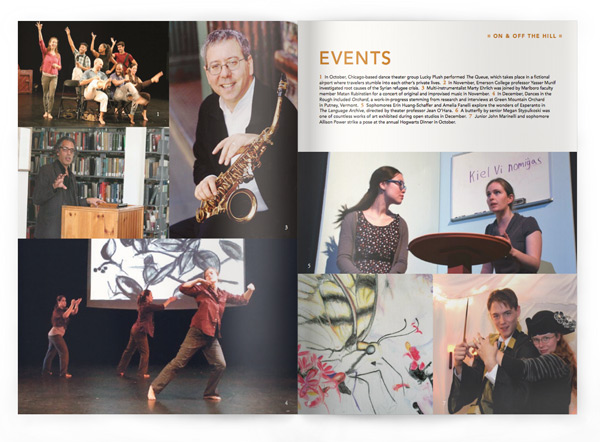
1 In October, Chicago-based dance theater group Lucky Plush performed The Queue, which takes place in a fictional airport where travelers stumble into each other’s private lives. 2 In November, Emerson College professor Yasser Munif investigated root causes of the Syrian refugee crisis. 3 Multi-instrumentalist Marty Ehrlich was joined by Marlboro faculty member Matan Rubinstien for a concert of original and improvised music in November. 4 In December, Dances in the Rough included Orchard, a work-in-progress stemming from research and interviews at Green Mountain Orchard in Putney, Vermont. 5 Sophomores Erin Huang-Schaffer and Amelia Fanelli explore the wonders of Esperanto in The Language Archive, directed by theater professor Jean O’Hara. 6 A butterfly by senior Megan Stypulkoski was one of countless works of art exhibited during open studios in December. 7 Junior John Marinelli and sophomore Allison Power strike a pose at the annual Hogwarts Dinner in October.
Focus on Faculty
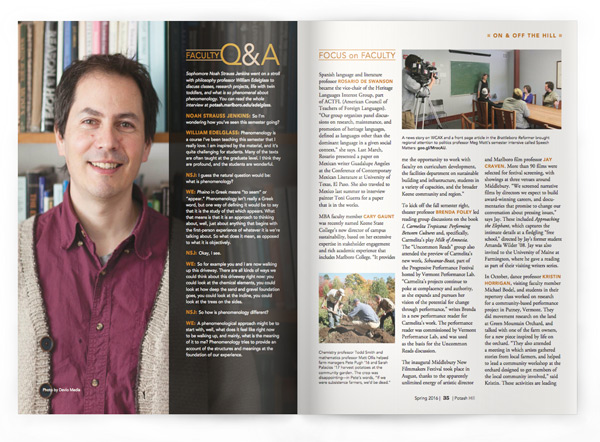
Faculty Q&A
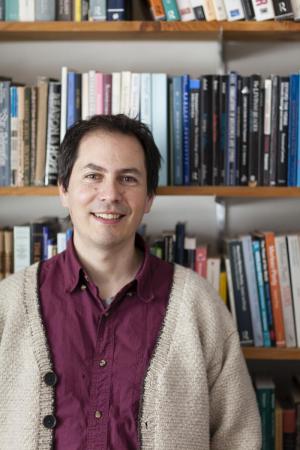 Sophomore Noah Strauss Jenkins went on a stroll with philosophy professor William Edelglass to discuss classes, research projects, life with twin toddlers, and what is so phenomenal about phenomenology. You can read the whole interview.
Sophomore Noah Strauss Jenkins went on a stroll with philosophy professor William Edelglass to discuss classes, research projects, life with twin toddlers, and what is so phenomenal about phenomenology. You can read the whole interview.
Noah Straus Jenkins: So I’m wondering how you’ve seen this semester going?
William Edelglass: Phenomenology is a course I’ve been teaching this semester that I really love. I am inspired by the material, and it’s quite challenging for students. Many of the texts are often taught at the graduate level. I think they are profound, and the students are wonderful.
NSJ: I guess the natural question would be: what is phenomenology?
WE: Phaino in Greek means “to seem” or “appear.” Phenomenology isn’t really a Greek word, but one way of defining it would be to say that it is the study of that which appears. What that means is that it is an approach to thinking about, well, just about anything that begins with the first-person experience of whatever it is we’re talking about. So what does it mean, as opposed to what it is objectively.
NSJ: Okay, I see.
WE: So for example you and I are now walking up this driveway. There are all kinds of ways we could think about this driveway right now: you could look at the chemical elements, you could look at how deep the sand and gravel foundation goes, you could look at the incline, you could look at the trees on the sides.
NSJ: So how is phenomenology different?
WE: A phenomenological approach might be to start with, well, what does it feel like right now to be walking up, and mainly, what is the meaning of it to me? Phenomenology tries to provide an account of the structures and meanings at the foundation of our experience.
Focus on Faculty
Spanish language and literature professor Rosario de Swanson became the vice-chair of the Heritage Languages Interest Group, part of ACTFL (American Council of Teachers of Foreign Languages). “Our group organizes panel discussions on research, maintenance, and promotion of heritage languages, defined as languages other than the dominant language in a given social context,” she says. Last March, Rosario presented a paper on Mexican writer Guadalupe Angeles at the Conference of Contemporary Mexican Literature at University of Texas, El Paso. She also traveled to Mexico last summer to interview painter Toni Guerra for a paper that is in the works.
MBA faculty member Cary Gaunt was recently named Keene State College’s new director of campus sustainability, based on her extensive expertise in stakeholder engagement and rich academic experience that includes Marlboro College. “It provides me the opportunity to work with faculty on curriculum development, the facilities department on sustainable building and infrastructure, students in a variety of capacities, and the broader Keene community and region.”
To kick off the fall semester right, theater professor Brenda Foley led reading group discussions on the book I, Carmelita Tropicana: Performing Between Cultures and, specifically, Carmelita’s play Milk of Amnesia. The “Uncommon Reads” group also attended the preview of Carmelita’s new work, Schwanze-Beast, part of the Progressive Performance Festival hosted by Vermont Performance Lab. “Carmelita’s projects continue to poke at complacency and authority, as she expands and pursues her vision of the potential for change through performance,” writes Brenda in a new performance reader for Carmelita’s work. The performance reader was commissioned by Vermont Performance Lab, and was used as the basis for the Uncommon Reads discussion.
The inaugural Middlebury New Filmmakers Festival took place in August, thanks to the apparently unlimited energy of artistic director and Marlboro film professor Jay Craven. More than 90 films were selected for festival screening, with showings at three venues around Middlebury. “We screened narrative films by directors we expect to build award-winning careers, and documentaries that promise to change our conversation about pressing issues,” says Jay. These included Approaching the Elephant, which captures the intimate details at a fledgling “free school,” directed by Jay’s former student Amanda Wilder ’08. Jay was also invited to the University of Maine at Farmington, where he gave a reading as part of their visiting writers series.
In October, dance professor Kristin Horrigan, visiting faculty member Michael Bodel, and students in their repertory class worked on research for a community-based performance project in Putney, Vermont. They did movement research on the land at Green Mountain Orchard, and talked with one of the farm owners, for a new piece inspired by life on the orchard. “They also attended a meeting in which artists gathered stories from local farmers, and helped to lead a community workshop at the orchard designed to get members of the local community involved,” said Kristin. These activities are leading up to an Orchard Pageant planned for July 2017 that will include dancing, puppets, and music.
In December, politics and gender studies professor Meg Mott participated in a CNN roundtable titled “Why Do Politicians Get Away with Lying?” “In America, when it comes to populist interests, facts are not as legitimate as feelings,” writes Meg. “At least when it comes to running election campaigns.” In August, Meg was quoted in a Christian Science Monitor article, also picked up by Yahoo.com, titled “Why Is ‘Teflon Trump’ Still So Popular?” Learn more. Meg was also quoted in a QC Research article titled “Young Voters,” where she applauded the key role young voters are playing in reframing political debate from one on “law and order” to one about justice and legitimacy.
In January 2015, economics professor John Rush presented a paper at the Economics of Global Poverty conference in Wenham, Massachusetts, titled “The Impact of Natural Disasters on Poverty in Indonesia.” He was also invited to present at the Southern Economic Association’s annual meeting in New Orleans in November, where he spoke about “Rural Households, Education, and the Empact of El Salvador’s 2001 Earthquakes.” “Both papers flow from my research agenda exploring the fact that natural disasters affect families not just through direct impacts but also by disrupting the businesses, institutions, and infrastructure of the wider community,” says John.
In October, Library Director Beth Ruane presented a “faculty forum” on her ongoing research in Nepal, titled “Searching in Nepal: Information-Seeking Behavior in Kathmandu.” “Libraries have always been a place of change and adaptation, and important places within a community where resources and ideas can be freely shared,” says Beth. “Without the information infrastructure upon which we have come to depend, how does knowledge circulate in Nepal?” In November and December, Beth traveled to Kathmandu to further her research on this and related questions.
As the co-curator of the New Metrics channel of Sustainable Brands, MBA faculty member Bill Baue helped organize the New Metrics Conference in Boston last October. “This year’s agenda, in my humble opinion, is the best so far in the history of the conference,” says Bill, who facilitated workshops on “Net Positive” and “Materiality,” in addition to speaking in sessions on “ThriveAbility.” MBA faculty member Mark McElroy also facilitating a workshop on the MultiCapital Scorecard. Bill and Mark co-authored an article in the July 2015 Journal of Responsible Finance, as well as parts of a new book titled A Leader’s Guide to ThriveAbility: A Multi-Capital Operating System for a Regenerative, Inclusive Economy. Mark also coauthored an article on the MultiCapital Scorecard in Harvard Business Review.
In October and November, psychology professor Tom Toleno discussed “Exploring Modern Africa” in a series of lectures, part of the fall lecture series at the Osher Lifelong Learning Institute, in Dummerston, Vermont. Subjects included postcolonial African society, religion, literature, culture, and education, as well as issues around working in Africa. Tom shared his experiences living, traveling, and working extensively in Africa, particularly in the Republic of Malawi.
MBA faculty member Lori Hanau had an article titled “The Paradigm Shift to Shared Leadership: From Round Earth to Flat Hierarchies” in the fall issue of Conscious Company magazine. “Of course, the earth was always round, even when we believed it wasn’t,” writes Lori. “When we change our paradigms, we make visible what we couldn’t imagine before.” In October, Lori also spoke at a Conscious Company “Sum+Substance” event, where she participated in a panel on the path to fulfilling work. Learn more.
In November, faculty members Cathy Osman (painting), John Willis (photography), and Seth Harter (Asian studies) participated in the first annual symposium of the Six Colleges Collaborative, a partnership of colleges in southeastern Vermont. The symposium, titled “Linking Your Course to the Community and Beyond,” explored ways to connect students to local employers, agencies, and civic organizations. In two roundtable discussions, the Marlboro faculty members shared their experiences enhancing student learning through interaction with community partners.
In November, religion professor Amer Latif gave a talk titled “The Sighs of Abraham: A Qur’anic and Sufi Portrait” at the All Souls Church in West Brattleboro. “The Qur’an describes Abraham as clement, and sighing often,” says Amer, who reflected on some of the ways in which Muslim contemplatives have understood Abraham’s friendship with God and his qualities of clemency and patience. Amer also led a discussion on campus about spiritual health, part of Student Life’s holistic education program titled For Your Engagement (FYE). In the words of one admiring sophomore who attended, “Amer totally killed it.”
In the last year, philosophy professor William Edelglass completed his term as co-director of the International Association of Environmental Philosophy, but he has remained busy regardless. He taught a graduate seminar on Phenomenology of the Body at the Indian Institute of Technology–Bombay, one of the top universities in India. William was interviewed by Insight Journal for an article titled “Cultivating Bodhicitta: Wisdom and Compassion in Śāntideva’s Introduction to the Awakened Life” (April 2015), and he has two chapters forthcoming in philosophy books to be published this year. William has also given several invited lectures in the past year, including “Describing the Beyond of Language: Phenomenology and Apophatic Discourse,” at the October meeting of the Society for Asian and Comparative Philosophy, in Atlanta.
In her new role as director of Marlboro’s Center for Creative Solutions, art history professor Felicity Ratté is currently in the throes of organizing a Spring Convening in April, on the subject of the future of public education. “Many of us in Windham County are thinking about Act 46 right now,” says Felicity. “The aim of this workshop is to think beyond the act. This event is structured to create a space where stakeholders can begin to define the “equity,” “excellence,” and “value” that the act promotes.
As a member of the Women’s Resource Center Advisory Board, physics professor Sara Salimbeni helped organize a reading and discussion of the book Schoolgirls, by Peggy Orenstein, at the beginning of the spring semester. The book explores the struggle with self-esteem some girls experience during adolescence, and the social costs of gender stereotypes in terms of declining academic achievement, especially in math and science.
Photography professor John Willis and music professor Matan Rubinstein collaborated to create a multimedia piece, part of the Eyes on the Land show at Shelburne Museum’s Pizzagalli Center for Art and Education last fall. The result of a partnership between the Shelburne Museum and Vermont Land Trust, the exhibit commissioned 13 contemporary Vermont artists and photographers to produce new works using conserved lands as their inspiration. John and Matan contrasted images and sounds from the Bunker Farm, in Dummerston, Vermont, with images and sounds from a scrap-metal yard, in their composition called “Inhabitation, Production/Consumption.” Learn more.
2015 Graduate Commencement
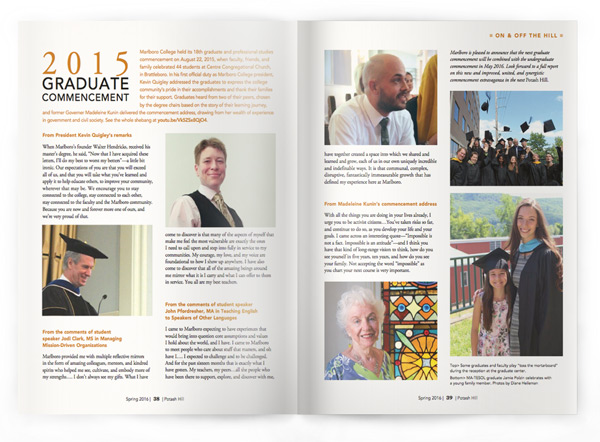
Marlboro College held its 18th graduate and professional studies commencement on August 22, 2015, when faculty, friends, and family celebrated 44 students at Centre Congregational Church, in Brattleboro. In his first official duty as Marlboro College president, Kevin Quigley addressed the graduates to express the college community’s pride in their accomplishments and thank their families for their support. Graduates heard from two of their peers, chosen by the degree chairs based on the story of their learning journey, and former Governer Madeleine Kunin delivered the commencement address, drawing from her wealth of experience in government and civil society. See the whole shebang.
From President Kevin Quigley’s remarks
When Marlboro’s founder Walter Hendricks, received his master’s degree, he said, “Now that I have acquired these letters, I’ll do my best to worst my betters”—a little bit ironic. Our expectations of you are that you will exceed all of us, and that you will take what you’ve learned and apply it to help educate others, to improve your community, wherever that may be. We encourage you to stay connected to the college, stay connected to each other, stay connected to the faculty and the Marlboro community. Because you are now and forever more one of ours, and we’re very proud of that.
From the comments of student speaker Jodi Clark, MS in Managing Mission-Driven Organizations
Marlboro provided me with multiple reflective mirrors in the form of amazing colleagues, mentors, and kindred spirits who helped me see, cultivate, and embody more of my strengths…. I don’t always see my gifts. What I have come to discover is that many of the aspects of myself that make me feel the most vulnerable are exactly the ones I need to call upon and step into fully in service to my communities. My courage, my love, and my voice are foundational to how I show up anywhere. I have also come to discover that all of the amazing beings around me mirror what it is I carry and what I can offer to them in service. You all are my best teachers.
From the comments of student speaker John Pfordresher, MA in Teaching English to Speakers of Other Languages
I came to Marlboro expecting to have experiences that would bring into question core assumptions and values I hold about the world, and I have. I came to Marlboro to meet people who care about stuff that matters, and oh have I…. I expected to challenge and to be challenged. And for the past sixteen months that is exactly what I have gotten. My teachers, my peers…all the people who have been there to support, explore, and discover with me, have together created a space into which we shared and learned and grew, each of us in our own uniquely incredible and indefinable ways. It is that communal, complex, disruptive, fantastically immeasurable growth that has defined my experience here at Marlboro.
From Madeleine Kunin’s commencement address
With all the things you are doing in your lives already, I urge you to be activist citizens…You’ve taken risks so far, and continue to do so, as you develop your life and your goals. I came across an interesting quote—“Impossible is not a fact. Impossible is an attitude”—and I think you have that kind of long-range vision to think, how do you see yourself in five years, ten years, and how do you see your family. Not accepting the word “impossible” as you chart your next course is very important.
Marlboro is pleased to announce that the next graduate commencement will be combined with the undergraduate commencement in May 2016. Look forward to a full report on this new and improved, united, and synergistic commencement extravaganza in the next Potash Hill.